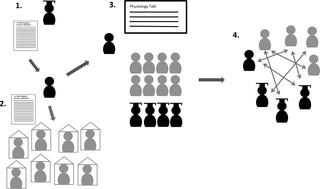Our official English website, www.x-mol.net, welcomes your
feedback! (Note: you will need to create a separate account there.)
Physiology education for intensive care medicine residents: A 15-minute interactive peer-led flipped classroom session.
PLOS ONE ( IF 2.9 ) Pub Date : 2020-01-24 , DOI: 10.1371/journal.pone.0228257 Bjoern Zante 1 , Wolf E Hautz 2 , Joerg C Schefold 1
PLOS ONE ( IF 2.9 ) Pub Date : 2020-01-24 , DOI: 10.1371/journal.pone.0228257 Bjoern Zante 1 , Wolf E Hautz 2 , Joerg C Schefold 1
Affiliation

|
INTRODUCTION
In acute care medicine, knowledge of the underlying (patho)-physiology is of paramount importance. This may be especially relevant in intensive care medicine, where individual competence and proficiency greatly depend on knowledge and understanding of critical care physiology. In settings with time constraints such as intensive care units (ICUs), time allotted to education is often limited. We evaluated whether introduction of a short, interactive, peer-led flipped classroom session is feasible and can provide ICU residents with a better understanding of critical care physiology.
MATERIALS AND METHODS
Using the flipped classroom concept, we developed a 15-minute peer-led interactive "physiology education" session to introduce a total of 44 residents to critical care physiology. Using a nine-item electronic survey with open questions and a five-point Likert scale, we analysed the overall concept with regard to feasibility, motivation, and subjective learning of critical care physiology.
RESULTS
The overall rate of response to the survey was 70.5% (31/44). The residents reported that these sessions sparked their interest (p = 0.005, Chi square 10.52), and that discussion and interaction during these sessions had promoted their knowledge and understanding. Both novice and experienced residents reported that new knowledge was imparted (both p<0.0001, Chi-square 32.97 and 25.04, respectively).
CONCLUSIONS
In an environment with time constraints such as the ICU, a 15-minute, interactive, peer-led flipped classroom teaching session was considered feasible and generally appeared useful for teaching critical care physiology to ICU residents. Responses to questions on questionnaires indicated that teaching sessions sparked interest and increased motivation. This approach may theoretically induce a modification in professional behaviour and promote self-directed learning. We therefore support the use of peer-led flipped classroom training sessions in the ICU. Whether these sessions result in improved ICU care should be addressed in subsequent studies.
中文翻译:

针对重症监护病房居民的生理学教育:15分钟的互动式同伴指导的课堂教学。
简介在急诊医学中,基础(病理)生理学知识至关重要。这在重症监护医学中尤其重要,因为个人能力和熟练程度在很大程度上取决于对重症监护生理学的了解和理解。在有时间限制的环境中,例如重症监护病房(ICU),分配给教育的时间通常很有限。我们评估了引入一个简短的,交互式的,由同伴主导的翻转课堂会议是否可行,是否可以使ICU居民更好地了解重症监护生理。材料和方法使用翻转的课堂概念,我们开发了一个15分钟的同伴指导的互动式“生理学教育”课程,向总共44位居民介绍了重症监护生理学。我们使用带有开放式问题和五点李克特量表的九项电子调查,我们分析了重症监护生理学的可行性,动机和主观学习方面的总体概念。结果对调查的总体答复率为70.5%(31/44)。居民报告说,这些会议激发了他们的兴趣(p = 0.005,卡方10.52),并且在这些会议期间的讨论和互动促进了他们的知识和理解。无论是新手还是经验丰富的居民都报告传授了新知识(p <0.0001,卡方值分别为32.97和25.04)。结论在有时间限制的环境中(例如ICU),需要15分钟的互动式,由同伴主导的翻转课堂教学会议被认为是可行的,并且通常看来对向ICU居民教授重症监护生理学很有用。对问卷问题的回答表明,教学会议激发了人们的兴趣并增强了他们的动力。从理论上讲,这种方法可以引起职业行为的改变,并促进自主学习。因此,我们支持在ICU中使用由同伴主导的翻转课堂培训课程。这些会议是否可以改善ICU护理,应在后续研究中解决。因此,我们支持在ICU中使用由同伴主导的翻转课堂培训课程。这些会议是否可以改善ICU护理,应在后续研究中解决。因此,我们支持在ICU中使用由同伴主导的翻转课堂培训课程。这些会议是否可以改善ICU护理,应在后续研究中解决。
更新日期:2020-01-26
中文翻译:

针对重症监护病房居民的生理学教育:15分钟的互动式同伴指导的课堂教学。
简介在急诊医学中,基础(病理)生理学知识至关重要。这在重症监护医学中尤其重要,因为个人能力和熟练程度在很大程度上取决于对重症监护生理学的了解和理解。在有时间限制的环境中,例如重症监护病房(ICU),分配给教育的时间通常很有限。我们评估了引入一个简短的,交互式的,由同伴主导的翻转课堂会议是否可行,是否可以使ICU居民更好地了解重症监护生理。材料和方法使用翻转的课堂概念,我们开发了一个15分钟的同伴指导的互动式“生理学教育”课程,向总共44位居民介绍了重症监护生理学。我们使用带有开放式问题和五点李克特量表的九项电子调查,我们分析了重症监护生理学的可行性,动机和主观学习方面的总体概念。结果对调查的总体答复率为70.5%(31/44)。居民报告说,这些会议激发了他们的兴趣(p = 0.005,卡方10.52),并且在这些会议期间的讨论和互动促进了他们的知识和理解。无论是新手还是经验丰富的居民都报告传授了新知识(p <0.0001,卡方值分别为32.97和25.04)。结论在有时间限制的环境中(例如ICU),需要15分钟的互动式,由同伴主导的翻转课堂教学会议被认为是可行的,并且通常看来对向ICU居民教授重症监护生理学很有用。对问卷问题的回答表明,教学会议激发了人们的兴趣并增强了他们的动力。从理论上讲,这种方法可以引起职业行为的改变,并促进自主学习。因此,我们支持在ICU中使用由同伴主导的翻转课堂培训课程。这些会议是否可以改善ICU护理,应在后续研究中解决。因此,我们支持在ICU中使用由同伴主导的翻转课堂培训课程。这些会议是否可以改善ICU护理,应在后续研究中解决。因此,我们支持在ICU中使用由同伴主导的翻转课堂培训课程。这些会议是否可以改善ICU护理,应在后续研究中解决。































 京公网安备 11010802027423号
京公网安备 11010802027423号